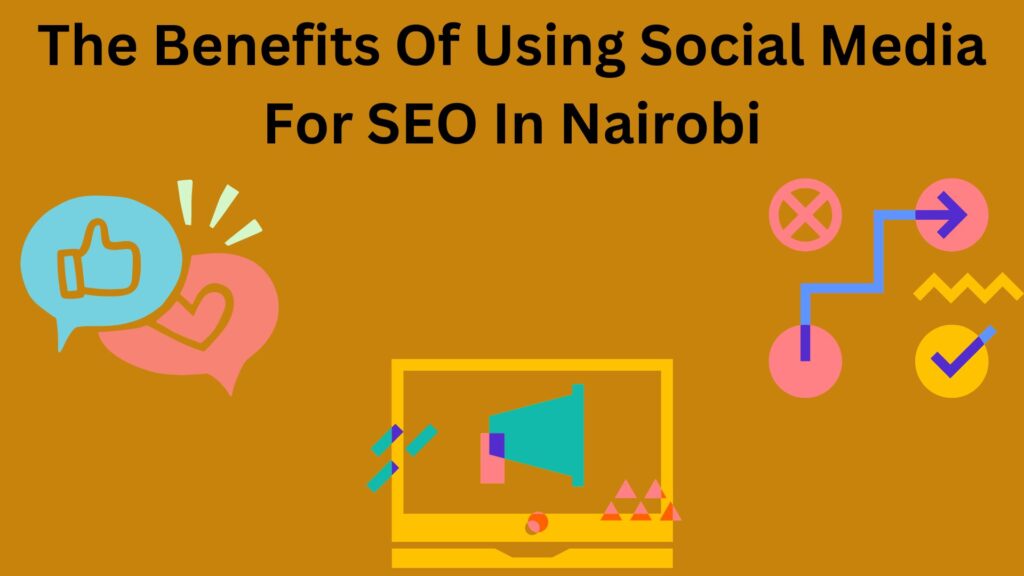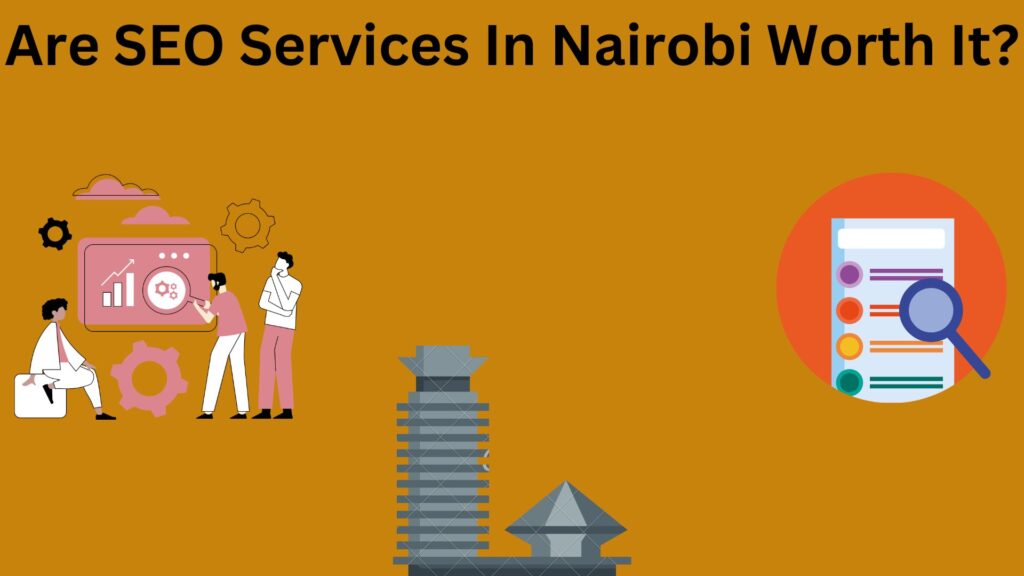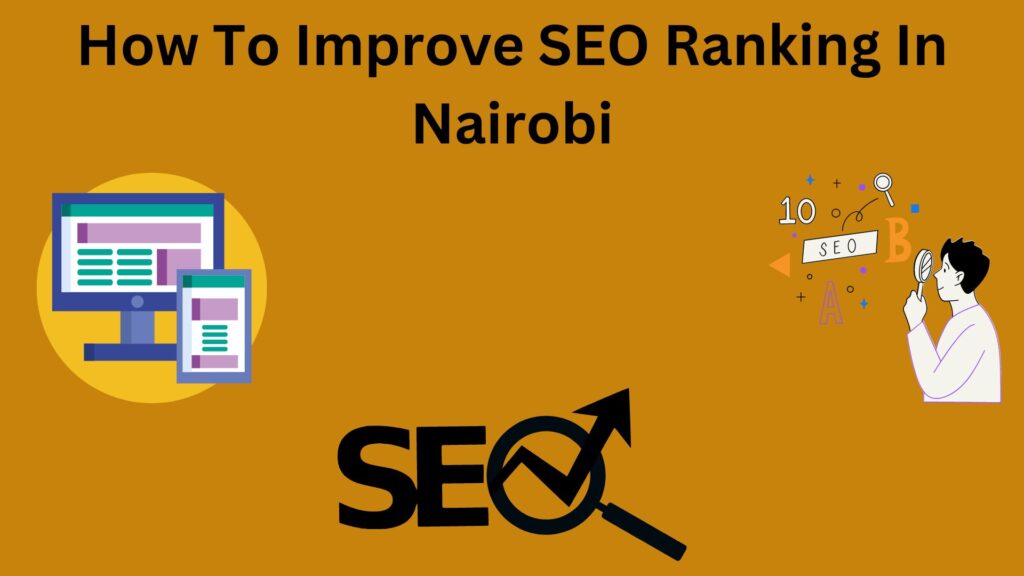Social media and search engine optimization (SEO) are two critical components of digital marketing that can assist Nairobi businesses in reaching more clients and increasing their online presence. Businesses can use social media sites like Facebook, Twitter, and Instagram to engage with their target audience, earn backlinks, and build a community of dedicated followers. Additionally, businesses can boost their presence in search engine results by providing high-quality content, employing keywords, and engaging influencers.
One of the most effective methods to use social media to increase SEO is to create high-quality content and share it on a regular basis. Businesses may attract new followers and drive more traffic to their websites by producing educational and interesting material on social media. Social media also allows for the creation of backlinks to a company’s website, which is an important aspect of SEO. Backlinks tell search engines that a site is important and should be ranked higher in search results.
Keywords are another approach to leverage social media for SEO. Businesses may help search engines comprehend the nature of their products and services by incorporating keywords in social media postings and other material, resulting in higher visibility in search results. Social media analytics can also be used to monitor the success of SEO campaigns and make data-driven decisions to boost online visibility. Businesses may find areas for improvement and optimize their strategy by analyzing indicators such as website traffic, social media engagement, and conversion rates.
Engaging influencers can also be a strong strategy to reach a wider and more targeted audience. Influencers have a significant following and can increase a company’s online visibility by including links to their website or social media accounts in their posts.
Let’s get started on the blog!
Utilizing Keywords
Keywords are an important part of both social media and SEO in Nairobi. Keywords are the words and phrases that users type into search engines while looking for products or services. By including these keywords in your social media postings and website content, you may boost your exposure in search engine results and more effectively reach your target audience.
Using keywords in your posts, captions, and hashtags on social media can help your material be discovered by those looking for related information. You may boost the likelihood of potential buyers seeing your material by utilizing keywords related to your products or services. Furthermore, by putting keywords in your social media bio and profile information, you can assist individuals in finding your company when they search for specific topics.
Keywords are even more crucial in SEO because they assist search engines to find your website. Keywords are used by search engines to understand the content and purpose of a website, as well as to determine how relevant it is to a user’s search query. By integrating keywords in your website’s content, meta tags, and URLs, you can tell search engines what your site is about and boost the likelihood that individuals searching for related terms will find it.
To use keywords effectively in your social media and SEO activities, undertake keyword research to determine the most relevant and commonly searched terms connected to your business. Google’s Keyword Planner, Ahrefs, and SEMrush are other tools you can utilize for this. Once you’ve found your keywords, you can use them naturally and organically in your social media posts, website content, and meta tags, avoiding keyword stuffing.
Other considerations for SEO include website structure, backlinks, and mobile friendliness.
Engaging Influencers
Influencer marketing is a type of advertising in which firms collaborate with individuals who have a strong social media following to promote their products or services. Businesses may swiftly expand their reach and gain access to a new audience by utilizing the reach and influence of these individuals.
Influencer marketing may be especially beneficial for Nairobi businesses since it helps them to target specific demographics and attract individuals who are likely to be interested in their products or services. For example, if a company sells fashion products, it may collaborate with a fashion influencer who has a huge following among fashion-conscious people. Working with this influencer allows the company to reach a highly focused audience and boost the likelihood of a sale.
Engaging influencers can increase a business’s online presence in addition to accessing a broader audience. Influencers that share a company’s products or services on their social media accounts are effectively endorsing the brand to their followers. Furthermore, influencers can help to increase a company’s visibility by connecting to their website or social media accounts in their postings, which can bring more traffic to the company’s online presence.
It is critical to carefully identify the correct influencers to work with in order to get the most out of influencer marketing. Look for influencers with a significant and active following who share your company’s values and messaging.
It’s also worth noting that, while engaging influencers can be a strong tool for growing online visibility, it shouldn’t be a company’s only plan. A comprehensive approach that incorporates other marketing methods such as social media advertising, email marketing, and content marketing will be the most successful way to reach and engage your target audience.
Using Social Media Analytics
Using social media analytics is critical for Nairobi businesses trying to optimize their social media and SEO operations. Social media analytics may help businesses find areas for development and inspire data-driven decisions by providing useful insights into the performance of their social media operations.
Tracking success on social media is essential for a variety of reasons. For starters, it enables firms to assess how effectively their efforts are performing and make adjustments as needed. For example, if a company isn’t receiving the interaction they want on a certain social media site, it may utilize analytics to figure out why and make changes to enhance performance.
The ability to make data-driven judgments is another crucial component of social media analytics. Businesses that have access to the correct data and metrics can identify and expand on successful plans and techniques. Businesses, on the other hand, can make adjustments or pivot their approach by recognizing the techniques that aren’t working.
Social media metrics can be tracked and analyzed using a variety of tools and software, including Facebook Insights, Twitter Analytics, and Google Analytics. Each of these apps offers thorough data on parameters like engagement rates, website traffic, and conversion rates. Additionally, these technologies can reveal demographic information about your audience, such as age, gender, geography, and so on.
When using these analytics tools, it is critical to concentrate on the indicators that are most significant to your business. For example, if your primary goal is to increase website traffic, you should concentrate on metrics such as click-through rate and website visits. If your primary goal is to produce leads, you should concentrate on metrics such as conversion rate and lead creation.
Examples Of Metrics To Track
Tracking the appropriate metrics is critical for Nairobi businesses trying to optimize their social media and SEO operations. Businesses should monitor many important parameters to acquire a better understanding of their online performance and discover opportunities for development. Some metrics to monitor are as follows:
1. Website Traffic
This indicator counts the number of people who visit a website. Tracking website traffic is essential for understanding how well your website is functioning in terms of drawing visitors. Businesses can watch this measure to discover which channels and campaigns are delivering the most traffic to their website and make changes appropriately.
2. Social media engagement
This indicator assesses the level of activity on a company’s social media pages. Likes, shares, comments, and other types of involvement are included. Businesses may assess how effectively their content is resonating with their audience by tracking social media engagement and making changes to boost engagement levels.
3. Conversion rates
This indicator counts the number of website visitors who complete a desired activity, such as making a purchase or completing a contact form. Businesses can learn how well their website is functioning in terms of converting visitors into customers by tracking conversion rates. You may maximize the return on investment of your online marketing efforts by optimizing your website and messages to improve conversion rates.
4. Demographics of visitors
This measure provides information about a website’s visitors’ age, gender, geography, and interests. Businesses can make better judgments about what type of content and goods to generate, which channels to employ, and even the most effective messages and techniques to use if they understand who their audience is.
5. Bounce rate
The percentage of visitors that leave a website after reading only one page is referred to as the bounce rate. A high rate may imply poor design, long load times, irrelevant information, or a lack of engagement. Its tracking and analysis can aid in the identification of website faults as well as the improvement of user experience, website navigation, content relevancy, and marketing activities focused on the target population. Overall, it’s a critical metric for optimizing a website and retaining visitors.
Tools For Analytics
Tracking and analyzing social media data is a critical component of maximizing your efforts in Nairobi. Businesses can use a variety of tools and software to track and evaluate critical metrics such as website traffic, social media engagement, conversion rates, visitor demographics, and bounce rates. Some well-known instances are:
1. Google Analytics
Google Analytics is a free online analytics service that tracks and reports on website traffic. It provides a multitude of data and insights, such as website traffic, demographics, and how users interact with your website. Businesses may use Google Analytics to measure metrics such as website visits, bounce rate, and conversion rates, as well as create segments and custom reports to have a better understanding of the data.
2. Hootsuite Insights
A social media analytics tool included in the Hootsuite social media management platform. It provides information about measures like reach, engagement, and conversions for businesses social media profiles. Furthermore, Hootsuite Insights allows businesses to track mentions and activity on various social networks at the same time, which is useful for organizations with a presence on numerous platforms.
3. Sprout Social
Sprout Social is a social media management and analytics tool that delivers deep insights into a company’s social media performance. It enables businesses to track KPIs such as engagement rates, reach, and follower growth, as well as precise information on their audience’s demographics and interests.
4. Agorapulse
A social media management and analytics software that offers businesses a variety of indicators and insights into their social media performance. It enables businesses to track KPIs such as engagement rates, reach, and follower growth, as well as precise information on their audience’s demographics and interests. Furthermore, Agorapulse offers a variety of social listening and marketing automation services that can assist firms in maximizing their efforts.
5. Buffer Analytics
Buffer Analytics is a social media analytics application that delivers granular metrics on a company’s social media success. It enables businesses to track KPIs such as engagement rates, reach, and follower growth, as well as precise information on their audience’s demographics and interests. Furthermore, Buffer Analytics enables businesses to measure and compare their performance across numerous social media channels, which is beneficial for organizations with a presence on many platforms.
In conclusion, collecting and analyzing social media stats is an important element of maximizing your Nairobi social media and SEO activities. The tools mentioned above are some of the most widely used on the market. Businesses may measure crucial metrics and obtain useful insights into their online performance by using these tools, which can help them identify areas for improvement and optimize their tactics. It is vital to note that the suitable tool for a business is determined by the sort of metrics that will be tracked, the number of platforms that will be tracked, and the budget.
Frequently Asked Questions On The Benefits Of Using Social Media For SEO In Nairobi
Social media can aid SEO by improving brand visibility, driving website traffic, and creating backlinks. Social media can also aid in the establishment of a company as an authoritative source of information, which can boost search engine rankings.
Yes, social media can increase website traffic by offering a forum for businesses to publish content and links, directing potential buyers to their websites.
Yes, social media can aid in the improvement of search engine results. Businesses may increase their online visibility and search engine rankings by providing high-quality content, employing keywords, and engaging with influencers.
A strong social media presence can help to enhance SEO by establishing a business as an authoritative source of information, which leads to greater visibility, website traffic, and backlinks, all of which are essential aspects of SEO.
Yes, businesses can use analytics tools such as Google Analytics, Hootsuite Insights, Sprout Social, Agorapulse, and Buffer Analytics to gain insights into website traffic, social media engagement, conversion rates, demographics, and bounce rate to track the progress of their social media and SEO efforts.
Conclusion
Finally, leveraging social media for SEO in Nairobi can help businesses boost their online visibility, attract a wider audience, and drive more traffic to their website.
Businesses may increase their search engine rankings, establish their brand as an authority source, and attract more visitors to their website by providing high-quality content, leveraging keywords, engaging with influencers, and using analytics tools.
However, it is critical to handle social media and SEO as part of a comprehensive plan rather than relying on a single component. Businesses may use social media to increase their online presence and drive more sales by following best practices and staying up to date with the newest trends.



